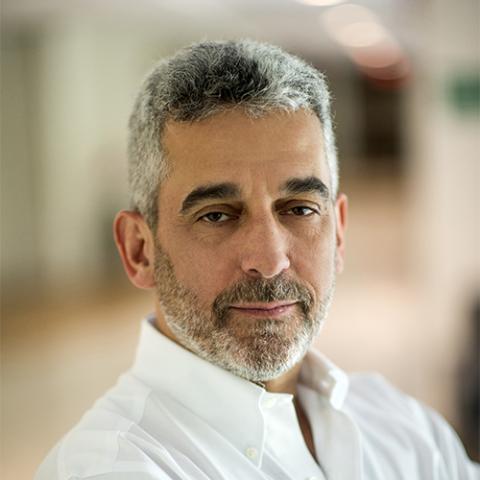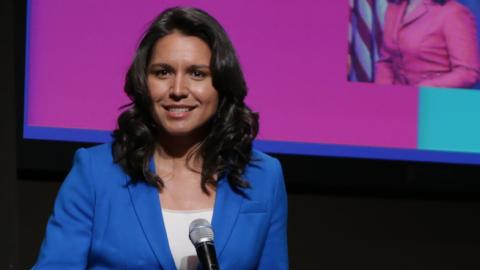Rep. Tulsi Gabbard, a Democrat from Hawaii, admitted to CNN that she met Syrian president Bashar al-Assad on her recent secret 4-day "fact-finding" trip to Damascus. "I did so because I felt that it's important that if we profess to truly care about the Syrian people, about their suffering," then we've got to be able to meet with anyone that we need to if there is a possibility that we can achieve peace," Gabbard told Jake Tapper of meeting with the man who along with his allies, Iran, Hezbollah, Russia, along with assorted Iranian-backed militias, is responsible for more than 400,000 deaths in Syria.
In published statements, Gabbard claimed she originally "had no intention of meeting with Assad," but that's hard to believe. In November, Gabbard introduced legislation to "end [the] illegal U.S. war to overthrow Syrian government of Assad." An Iraq war vet, Gabbard is either unaware or unconcerned she is advocating on behalf of a Syrian regime that bused foreign fighters—Sunni jihadists—from the Damascus international airport to the Iraqi border where they targeted her fellow servicemen and women.
Gabbard had previously declined to say who paid for her trip, along with former congressman Dennis Kucinich, who has made two previous trips to meet with Assad. But now her office says the trip was funded by the Ohio chapter of the Arab American Community Center for Economic and Social Services, which also paid for Kucinich's 2011 trip to the Syrian capital.
The executive director of AACESS is Bassam Khawam, who accompanied Gabbard on the trip. Khawam, who has donated to Kucinich's campaigns, is a member of the Syrian Social Nationalist Party (SSNP), a pro-Assad Lebanese political party that has sent members to fight on behalf of the Syrian regime during the almost 6-year-long conflict. The SSNP also sent fighters against Israel in support of Hezbollah during the 2006 Lebanon war. Founded in the 1930s, outside the Levant the SSNP is perhaps best known for the 2009 incident when party members attacked Christopher Hitchens on a Beirut street after the late journalist defaced an SSNP symbol that resembled a swastika.
Gabbard calls Khawam, a member of one of the region's most violent, anti-Semitic groups in the Middle East a "peace activist."
Gabbard's trip has some Arab sources I spoke with concerned that she may be serving as an unofficial envoy for the Trump administration looking to make a deal with Assad. The congresswoman met with the president in November and reportedly has a fan in Trump strategist Steve Bannon, but it's likelier she's simply marketing another piece of legislation, the Stop Arming Terrorists Act. "The legislation," her website reads, "would prohibit the U.S. government from using American taxpayer dollars to provide funding, weapons, training, and intelligence support to groups like the Levant Front, Fursan al Ha and other allies of Jabhat Fateh al-Sham, al-Qaeda and ISIS, or to countries who are providing direct or indirect support to those same groups."
The legislation is essentially a further defense of Assad. "Gabbard's bill may appear to be in line with the Trump administration's position on fighting Sunni jihadist outfits like ISIS and Jabhat Fateh al-Sham," says Tony Badran, research fellow at the Foundation for Defense of Democracies. "But as Gabbard's comments following her Syria visit make clear, she believes not only that these groups are instruments of U.S. allies like Turkey and Saudi Arabia, but that all Syrian groups supported by these allies are terrorists. This is the Assad regime line."
Instead of attacking Sunni powers allied with the United States as terrorists, the Trump administration is instead trying to rebuild the traditional U.S. alliance system in the Middle East. Turkish foreign minister Mevlut Cavusoglu met with new national security adviser Mike Flynn a few days before attending Trump's inaugural. And this week Saudi foreign minister Adel Jubeir said he was "optimistic" after his meetings with Trump officials. "The positions that President Trump has articulated," said Jubeir, "are ones that we are completely in accordance with: restoring America's presence in the world is something we … welcome because the lack of an American engagement leads to a vacuum."
And over the last several years of the Obama administration that vacuum was filled by Russia. Analysts and journalists at home and abroad are fearful that the Trump administration is likely try to strike a bargain with Vladimir Putin. However, other news yesterday perhaps merits a re-evaluation of a theme that has dominated foreign policy talk for months: Trump is expected to order the Pentagon and State Department to draw up plans for no-fly zones in Syria.
Clearly Trump's main purpose is to offer a solution for Syrian refugees while he is closing American borders to those fleeing the war. Here it looks like Trump is breaking with Obama policy. When policymakers like John McCain proposed a buffer zone, the Obama administration argued that was impossible because of the Russian-made air defenses protecting the regime, operated first by the Syrians and later by the Russians themselves. The Trump White House knows this. It may never establish a no-fly zone, but it is announcing that American interests are not going to be hemmed in by the Russians.
Indeed, for all the concern of Trump's putative friendship with Putin, the White House is spending little time talking to the Russians about the Middle East and much more time with its regional partners, especially Israel. Jerusalem has been clear that they don't want an endgame in Syria that places Iran on their doorstep. However, as Tony Badran explains, "the Israelis have had to adapt to the reality that Obama shoved down their throats by letting Russia establish a position in Syria. So they have had to talk to the Russians to find a way to square the circle: secure this vital national security interest even as they acknowledge that the Russians and the Iranians are working together in Syria."
There's some speculation that the Trump administration may seek ways to pry Iran and Russia apart, but this is the same game that American policymakers have played in the Levant for decades—in the '60s-'80s the task was to pry Syria from the Soviet Union, from the '90s to 2011, it was wedging Syria away from Iran. It didn't work then, and it won't work now. Russia and Iran are not in a marriage of convenience but are strategic partners. Putin escalated in Syria not to save the Assad regime, which was decimated years ago, but to preserve Iran's position. It was Qassem Suleimani, not Assad, who asked for Putin's help. The troops on the ground that the Russian air force is supporting are IRGC forces, Hezbollah, and other Iranian-backed militias. There is no more Syrian army, or Syrian regime.
And that's why it's worth paying special attention to what Israel is saying publicly to understand what it's likely telling the Trump team. Defense Minister Avigdor Lieberman is particularly noteworthy in this context. He's Israel's Russia guy, a Moldovan-born immigrant who speaks fluent Russian and reportedly gets along with the leadership cadre in Moscow, including Putin. Lieberman has been insisting publicly for several months now, as recently as this week, that Assad has to go. And he knows as well as anyone there is no Assad regime anymore, it's just Iran and Russia. What it seems he means is, not only can Israel not accept Iran setting up on its border, but Russia has to go, too.
Is Trump listening? Who knows? American allies aren't about to tell the new president how to deal with Putin, but the Israelis and others are letting him know how much that vacuum has cost them.
















